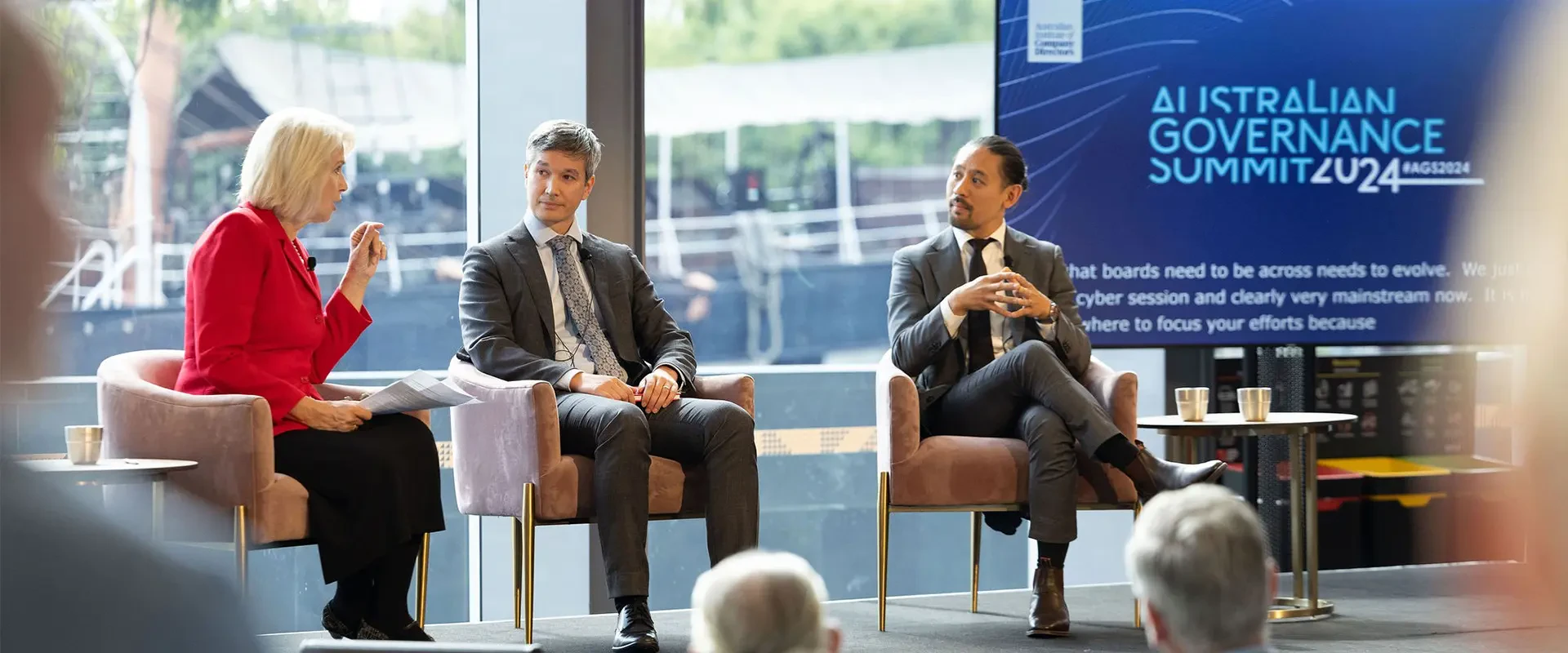
Subscribe to stay informed, inspired and involved.
The Australian Institute of Company Directors (AICD) hosted its major annual event, the Australian Governance Summit (AGS), on March 20 & 21, aimed at empowering our director community to anticipate change, understand its implications, and proactively set the course for a bold future. As the supporting sponsor of the event, Morrow Sodali conducted a session titled "Investor and Proxy Advisor Expectations in Challenging Times".
Moderated by Walkley Award-winning Australian journalist and broadcaster, Helen Dalley, the session was conducted by Aldi Djajaputra, Managing Director of Corporate Governance at Morrow Sodali, alongside Philip Foo, Vice President of APAC Research & Engagement at CGI Glass Lewis. The session addressed pressing questions regarding the turbulent 2023 Australian AGM Season; the evolving relationship between shareholders, proxy advisors, and boards amidst challenging economic and geopolitical conditions; and an increasing focus on environmental, social and governance (ESG) factors.
Below are some key insights from the session:
- Key Lessons from the 2023 AGM Season: The 2023 AGM season saw a record number of remuneration ‘strikes’ and protest votes against director elections across the ASX300. Factors contributing to this included scrutiny over strategic direction and underperformance, and high-profile cases of reputational loss, shareholder activism and major ESG controversies (e.g., workplace fatalities, cyber security breaches).
- Focus on Investor and Proxy Advisor Expectations: Aldi Djajaputra and Philip Foo discussed the evolving relationship between shareholders, proxy advisors, activist groups and boards, emphasising the importance of these relationships amidst challenging economic, geopolitical, and worsening climate change conditions.
- Importance of Engagement with Shareholders and Proxy Advisors: Boards need to engage proactively with shareholders throughout the year, not just in the lead up to the AGM or in a reactive manner (e.g., responding to a ‘strike’) to understand their policies, perspectives and concerns. Similarly, ongoing engagement with proxy advisors is crucial, particularly as governance-conscious investors like passive funds and superannuation funds pay close attention to proxy advisor research, as part of a holistic assessment to inform their voting decisions. To enable an effective engagement strategy, boards need to have a deep understanding of the ‘personality’ of their share register to ensure that investors who actually control the voting mandate are targeted for engagement, rather than portfolio managers responsible for investment decisions.
- Ongoing focus on ESG, with governance at the core: While the emphasis on ESG factors continues to grow, they reiterated the comments of Catherine Livingstone in her Keynote Presentation, which underscored the utmost importance of governance and suggesting that the acronym should be ‘GSE’. With emerging risk areas such as cyber security and artificial intelligence, they discussed ASIC’s ongoing expectations of board directors to ensure they responsibly manage all areas of risks, whether old or new, as part of their duty of care under the Corporations Act.
- Increasing shareholder activism: Shareholder activism was increasingly prevalent during the 2023 AGM season, with a number of successful public campaigns by fund managers to protest their concerns with company performance and strategy execution. This trend is likely to continue, requiring boards to adapt their engagement and response strategies accordingly.
- Upcoming Issues for Boards: In addition to company performance, cyber security, climate change, diversity and other ESG factors are expected to remain key areas of focus for stakeholders going forward – paying close attention to directors’ track records in managing these areas across their roles (past and present). They also discussed how boards should increase their focus on crisis management and business continuity processes in the wake of a material ESG event (e.g., cyber security breach), to ensure they have the appropriate plans and to navigate these challenges successfully.
To watch the full session, click here.
Summary
Author
